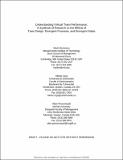Understanding Virtual Team Performance: A Synthesis of Research on the Effects of Team Design, Processes, and States
Author(s)
Mortensen, Mark; Caya, Olivier; Pinsonneault, Alain
DownloadSSRN-id1282095.pdf (332.7Kb)
Metadata
Show full item recordAbstract
Virtual teams are essential to the functioning of numerous organizations. They have been
the subjects of much research, resulting in a growing body of literature on the topic.
Nevertheless, our understanding of the performance impacts of different aspects of virtual teams
(e.g., the people, task, and technology), and the processes through which these come about,
remains relatively limited. The present paper reviews and synthesizes the virtual teams literature
in order to provide insights into the direct and indirect antecedents of virtual team performance.
We begin by differentiating among team design, team processes, and team states as antecedents
to virtual team performance. Using these categories, we review one hundred and twenty-two
empirical studies published between 1990 and 2007, covering five distinct dimensions of
performance (output quality, creativity and innovation, production efficiency, member
satisfaction, and learning). From our analysis, we develop an integrative framework that
summarizes the empirical evidence on the antecedents of virtual team performance and serves to
guide future research.
Date issued
2009Publisher
Cambridge, MA; Alfred P. Sloan School of Management, Massachusetts Institute of Technology
Series/Report no.
MIT Sloan School of Management Working Paper;4738-09
Keywords
information technology, team design, team states, team processes, Virtual teams, virtual team performance